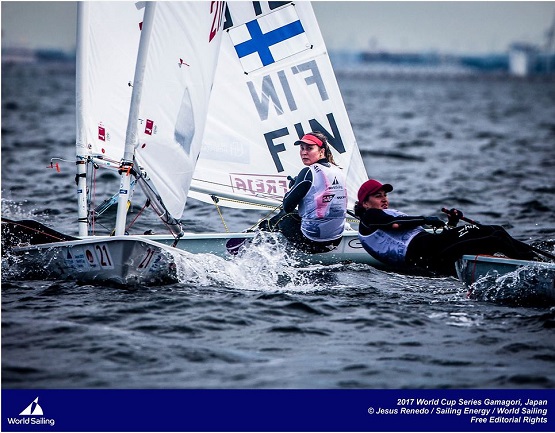Jon's Blog
Browse Category
- 2026 (0)
- Archive (2008 - 2026) (95)
2017
In 2017 Jon became Technical Director for Malaysia.
Well I guess it is now well overdue for my first blog of 2017, which I write shortly after returning to the UK from my new job in Lawgkawi, Malaysia where I am now working as Technical Director. I have always been interested in training, especially fitness/injury prevention, rules and psychology. As a Coach I probably spend more days on the water than off in a typical year.
As a Coach you can at any time help only a limited number of sailors. Indeed when on the Olympic circuit I usually work with only 1 or 2 sailors (co-incidentally both the number of free seats in my transporter van and the number of free spaces on my triple trailer), So by taking a Director’s job I have a great opportunity to help a huge number of sailors: Indeed a whole country.
Over the next few weeks I will be thinking about the most important aspects of sailing and featuring these in my blog. After all you see everything in hindsight with 20/20 vision and by working with the grass roots up I hope to provide a clear pathway to high performance. This means a logical progression which sailors, coaches and managers are aware of and instilling good habits from the word go.
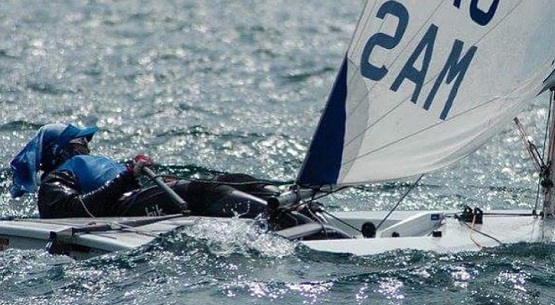
My goal for Malaysian sailing is to create a legacy, centred on long term thinking. After 1992 the funding for sport in Great Britain was at an all-time low and therefore unsurprisingly in the 1996 Olympics Great Britain won just 15 medals (including the 2 Silver from Sailing) its worst Olympic Games ever, finishing in 36th position. The then Prime Minister John Major set up the National lottery in 1994, the funding for which allowed athletes to train full time (28% of the fund goes to good causes such as sport and arts), rather than part time, and of course there is a huge performance advantage to have 6 full time training days a week rather than just 2. This effect took several years and the results of this are now clear; Rio was a hugely successful Olympics for Great Britain, finishing 2nd overall with 67 medals (including 2 Gold and 1 Silver).
Perhaps the best example I saw of short term thinking was whilst working for the Chinese in 2013, 2 things happened which would ultimately hugely affect the result in 2016... In 2012 everyone was delighted with Lily’s success; a Gold medal at the 2012 games, much more funding for the Radial class, who could ask for more? This however came at a price, full time coaching and support. The first issue was with health and fitness, right from the beginning of us working together Lily had the occasional shoulder ‘niggle’ which I remembered from my own experience in the 90s and I kept on top of it, knowing full well what would happen if we ignored the problem and ensuring she had rest when she needed it and built up the strength to protect the shoulder. Thankfully it did not affect her performance 2012.
In 2013 the Team were in money saving mode: the next Olympics seemed a long way off and they just wanted to spend time in China. After months of no coaching we made rapid performance gains when she returned to Europe, 15th Hyeres 2013, 6th Medemblik, 1st with a day to spare in Weymouth World Cup and at that point the Team Leader decided the performance was good enough and sent her back to China and again no coaching. So, sadly it was unsurprising that the shoulder problem continued to develop whilst in China until it was a huge problem by the 2013 Worlds (which were held in China) in October and of course there was lots of pressure for Lily to perform there. The issue which affected her performance was something which had been identified in 2011 but was pretty much ignored after the 2012 Olympics.
Unsurprisingly the Team Leader was unhappy with Lily’s performance and wanted me to fix it, I explained that we were doing our best but there was no way to make up for missed training half way through the competition – I taped her shoulders every day and we did everything we could but the damage was already done. Indeed I was very proud of a top 10 performance considering she was racing in a lot of pain. During the World Championships, there was something else we needed to talk about, another long-term problem and perhaps a topic for another blog but I was not allowed to talk at the time (the Team Leader just wanted to think about the Worlds’ result). I left China having explained to the Team Leader that she must be given the time to rest and recover; she must not complete in ANY more competitions in 2013, only to see her racing in the Chinese World Cup event without a coach, just a few weeks alter and forced to retire after just 2 days when she was so injured she could no longer sail…
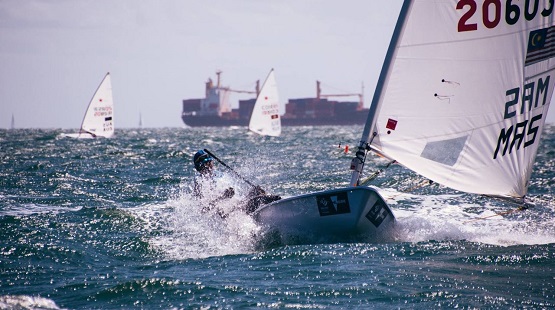
The Princess Sofia regatta
The Princess Sofia regatta perfect was the perfect warm up for the 2nd Sailing World Cup in Hyeres (unfortunately we missed the 1st round in Miami due to hip surgery but Tuula has made excellent progress and had some of her best races during the strong wind in Spain).
Now is still a period of reflection, on what I can learn from the past campaign and make better for the future. Every single day I learn something new and I believe this is one of the main reasons I love my job so much. It is also important to look back at the mistakes made, as this is surely the best learning opportunity for how we set good habits for the future.
So, to continue from my previous blog, and looking back on the issues at the start of the last campaign: 2013 was not only with a potentially career ending injury which could have been avoided if given immediate rest and rehabilitation but fundamentally with the problems caused when short term gain is put over long term benefits. Something which I understand happens in many societies which operate in a high degree of uncertainly with the leaders and coaches changing at any time and it would be remiss of me not to comment here on the amazing job that John Derbyshire Director of Sailing and Stephen Parks (Sparky) Olympic manager have done at the RYA for many, many years. They will be missed and without a doubt both have created a legacy which will live on.
Perhaps a good example of this is dealing with jet lag: to adjust to the new time zone quickly can be painful: you may have to force yourself to stay awake or get up when you really don’t want to. The fact is the sooner you adjust the better and by continuing an old sleeping pattern (which may at the time seem more comfortable) you are doing yourself more harm than good, delaying the inevitable switch to the new time zone and prolonging your period when you cannot function 100% during normal daylight hours. We need long term thinking.
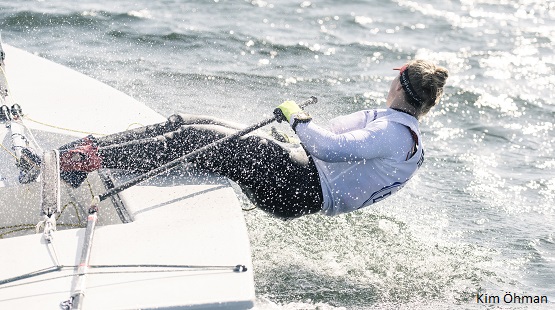
I am a huge believer in planning ahead: better to do things sooner rather than later. Whilst you may think you have plenty of time now, real life is not always ideal and a spanner can always get thrown in the works. So, whilst a positive mental attitude and always hoping for the best is of course a good thing, at the same time we must also prepare for the worst.
When it comes to logistics, the costs are black and white: flights, ferries and even hotels and parking become more expensive the later you leave it to book. It is crazy to delay things and waste huge amounts of money when you can be sitting in the exactly same seat on the plane having paid twice the money just because you didn't act early enough or worst-case scenario there may be no seats left on the plane you want or even no places left at the regatta, yet people regularly makes these mistakes. In most cases the planning is simple, just a matter of sitting down and working out which regattas you need to attend, how you get there and where you stay when you are there. At this stage, most of our 2018 planning is already set and it is just a case of filling in the detail.
One of the biggest barriers to performance is of course illness and injury, which of course is less black and white, part of which is luck and part of which is good planning. Simply, the better rested you are, the better your diet, the stronger and the better your immune system the more likely you are to avoid problems. Simply put, being strong and with a full range of motion can not only make you faster on the water but also prevent injuries before they occur. So, there is a fine balance between over and under training and this is something which comes with experience which means making a good plan.
Of course, when things do go wrong you need to act quickly. Taking the rest early when you get ill or injured can prevent it from becoming far worse, meaning a speedy recovery time and a better chance of a full recovery. Lijia Xu from China with whom I worked on 2 Olympic campaigns recently had decompression operations of both shoulders and was given 6 - 9 months recovery time, after struggling with the injury for more than 4 years.
So, when I started working with Tuula, of Finland, another fantastic sailor, I was very keen to see any potential problems dealt with as soon as possible. Poor Tuula has suffered with severe tonsillitis every winter, again for several years, which of course has directly and indirectly affected her sailing. This year she made the very sensible decision to get them removed and I am very proud to see her sailing so well in Japan after what is a very unpleasant procedure (which like most operations gets worse the older you are when you have it).
In future blogs, I will be looking at grass roots sailing...
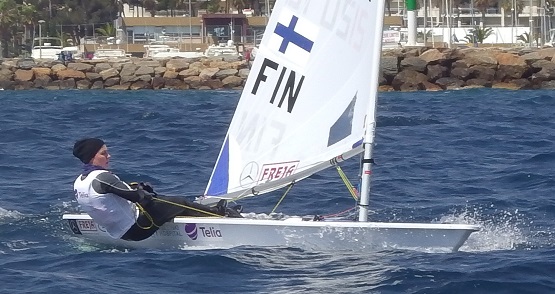
Grass roots sailing
Time spent making excuses and trying to justify mistakes is wasted time, and can become a very bad habit because it stops you thinking about how to avoid those mistakes in the future. If you close your eyes to your failings then you will find it very difficult to change them and this is why I am a huge fan of Goal setting. The ability to tackle weaknesses rather than simply defend them is what separate the Champions from the also rans.
Remember, in the future people will remember only the final result: who ran the race or regatta. Everyone has difficulties, everyone suffers setback, often beyond their control and it is how we deal with them that matters. Everyone is busy, everyone wishes they had more time but people always make time for what is truly important to them and it how you use that time that counts. Take responsibility for your actions and be the best you can be.
Of course. this winning mind is not just applicable to sailors, it is applicable to all successful people from many different walks of life.

The SEA Games
The event kicked off with an amazing opening display and I was very thankful to be seated with the VIPs rather than being part of the parade itself and avoiding a lengthy stand. Malaysia certainly pulled out all the stops to make all the countries feel welcome and the Philippians certainly have a hard act to follow.
It was certainly a different regatta. For doping, Team Leaders were required to draw cards to select which of their Athletes would be tested. I also saw the goal posts moved a couple of times. For example, the Malaysian Team Laser sailors at measurement were told that their 6-digit sail numbers had to match their hull numbers, even though they were borrowing the hulls from the National Sailing Centre. Yet later several teams were allowed to pass measurement with just a single sail number!
The Championships kicked off with Team racing and probably the most enjoyable event for me of the whole regattas was the Optimist team racing, not purely because Malaysia won but with 4 boats in a team there were some close calls, and it certainly improved my maths, trying constantly to calculate who was winning.
Fleet sizes were small, with some classes having as few as 4 entries. So, it looked very different from a normal championship. Often with quite a lot of pin end start line bias the match racing started early and until the medal races started I spent pretty much every evening in the protest room as an observer. The best was a run of 3 protests 18,19,20. I ended up joking to the Team Leader if he could make me a packed dinner to have then I would be very grateful, although I am not sure if my English sense of humour always translated.
Some of the racing was extremely close and although the 470 Men after a nervous first day went on to take a relatively easy victory, the 470 Women ended up losing the race and the Gold medal by a matter of feet on the finish line. Indeed there were lots of close racing with the 3 way tacking duel in the Laser men’s medal race being just another example.
The SEA games came to a close and with more photos taken than I have ever seen and the flag was handed to the Philippines. Indeed there were so many photos taken I struggled to find time to do my final debrief with the sailors who raced on the last day. Our next goal is the Asian games in Jakarta, Indonesia next year, time for Sailors, Coaches and Leaders to review what well went and what went wrong. Retirement for some, a change of class for others and new challenges for all.
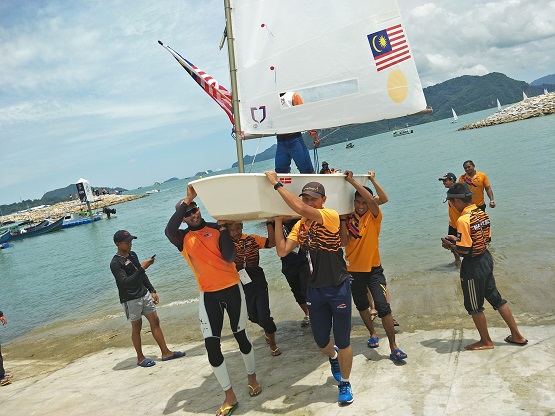
Vanhang Sailing
Grass roots sailing is about building a base and finding the Pete Burlings and the Ben Ainslies of the future. It takes years to nurture the talent and work starts now. In fact it is key as if the young sailors of tomorrow do not enjoy the sailing today we may lose them from the sport for ever. Toppers is one such class that provides excellent entry level access for new sailors and an ideal stepping stone up to single handed Olympic classes.
This year I have really enjoyed coaching Topper sailors and one of the nicest things is how much they improve from the start of the year. It seems like a lifetime ago (well getting on for 20 years) when I was Head Coach for working with the Northern Zone Topper Squad, indeed it was great when the sailors stopped by to say hello at the Dinghy Show over the past few years. Most are now married with kids of their own.
I missed the 2017 Topper Worlds due to prior comments and in 2018 the World Championships will be in Shenzhen, China, so just like with any major championships I will very shortly be off to test the venue, as well as running several training camps in China.
I will also be producing a Topper Technique video just as I did for the Laser class, just as soon as this busy season starts to calm down a bit. Normally the year after the Olympics is a bit quieter but for some reason that doesn't seem to have happened this Olympic cycle!
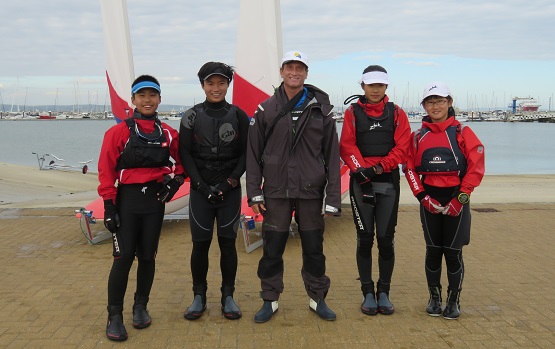
I had a couple of weekends preparation for the Worlds, the first at Pevensey Bay Sailing Club for the Masters Autumn regatta. I arrived in Pevensey straight after the 2017 SEA Games and luckily I managed to have a good sleep and so wasn’t too jet lagged. In face I think I had a little too much sun on the final day in Langkawi (I certainly wasn’t feeling great at prize giving). This may have been a blessing in disguise as for once I found it very easy to sleep on the plane.
At the Masters Autumn regatta I was really pleased to win every race, after I feel I have been struggling for form over the past few months after not quite getting the balance between coaching and racing myself. After racing I took my boat to Sailboat Deliveries where I loaded my boat and bag number 1. off to Croatia.
The second weekend was Barts Bash and Sunday morning racing at my home club in Weymouth, Castle Cove, using my 2nd boat. Andrew Simpson we remember with the Andrew Simpson Sailing Centre and the Worldwide annual event Barts Bash. Andrew who tragically died training with Artemis was truly one of the nicest guys in sailing and I actually shared a room with him at my first Radial worlds in Wakayama, Japan, in 1993 and I was really happy to win the event at WPNSA home of the Andrew Simpson Sailing Foundation.
Masters Worlds
I was very pleased to win the Radial Apprentice Masters Worlds , so good to be part of such a big event, nearly 350 boats from 35 countries. It was great the event was 7 days long as light wind meant 4 days of no racing meaning I was nice and fresh for the pack up (we had a 20 boat trailer at the event), and hot footing it to the next event…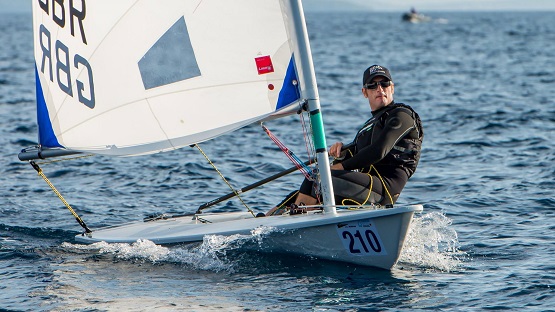
Radial Europeans
Upon arrival in Barcelona I did a little bit of work on Tuula's foils and when we turned the boat upside down to wash we noticed a 5 cm split on the gunwhale. It was a quick repair but that meant no training before the regatta started to allow proper drying time as racing was scheduled the following day or so we thought, the race officer had different ideas and decided to join most of Catalonia in going on strike, which meant no racing on day 1, at least the Barcelona Olympic Centre had a good gym. Indeed, I used it every day whilst waiting for the Sea breeze to arrive and the postponement flag to go down.
After the strike we did manage to catch up one race but only completed 5 out of 6 of the qualification races. With a very tight series (the overall Champion was decided by 1 point and only on the final race) many sailors must have been wondering what would have happened if we had done 1 more race. As it was overall Champion Marit who made almost no mistakes in the round robin ended up discarding a 2nd place. It was a good regatta and although we still have lots of work to do we were pleased with a solid 5th place.
This weekend I am racing at the 2nd UK Autumn Qualifiers, I missed the 1st event due to the Masters Worlds and I will miss the final Qualifier due to the Japanese World Cup which I fly to the day after the 2nd Qualifier along with bag number 3! He (bag number 3) will probably stay in the Japanese container and go straight to Miami. With all this travel I can really recommend the Neil Pryde Wheelie bags they are light (and won't take up too much of the flight weight allowance) but have plenty of room for your kit, I do not know what I would do without them!
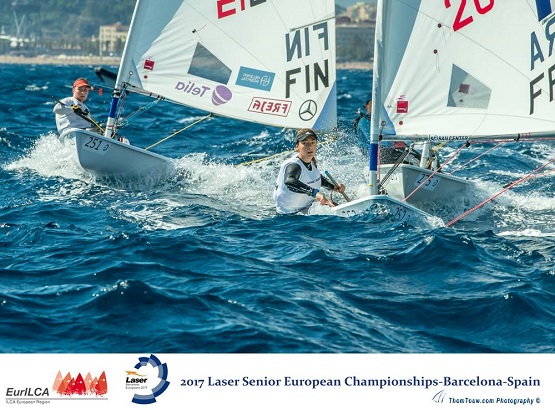
Eventually I made it back on home soil and collected bag number 1 from its Croatian holiday along with my Worlds boat and kit on Friday from Sailboat deliveries at Emsworth ready for Saturday racing at Hayling Island. The club accommodation there is a real blessing and helped me keep my travelling to a minimum.
Ultimately a solid 3rd place, 1 point off 2nd was enough for me to finish 2nd on the Radial ladder for 2017. 3 poor starts on the Sunday (1 the wrong end of the line, 1 black flag and 1 stuck to the pin end at start time) ultimately scuppered my chance of winning the event.
Gamagori
The following day I flew to Japan for the 1st World Cup of the 2017/2018 season. Just making the 1st race, or rather the 2nd 1st race. As the 1st 1st race was abandoned half way through if that makes sense. Tuula had a disappointing regatta, finishing 16th and had the opposite problem to me. She was continually line shy (too far behind the line at start time) but I am sure we can work together to solve this problem.
We are now in the Olympic venue of Ensoshima ready for our next event which has more teams and a higher standard than the World Cup as many people are eager to race on the Olympic venue. Shortly before our arrival the venue got hit by Typhoon Lan (no. 21) but the Japanese did a great job clearing up let us all hope that we can finish this regatta before the next Typhoon hits!
Enoshima
Overall I felt extremely conformable in Japan and the Japanese are so kind and polite. Rules are rules and it did make me laugh when back in Gamagori I saw the fuel truck at 14:55 and asked if I could have my fuel (which was meant to be available at 15:00 by the palm tree). The driver said very sorry but we had to wait until 15:00 and he would be by the Palma tree. So Tuula and I slowly walked to the Palm tree with driver, driving next to us at exactly walking pace. When we got there, the 3 of us waited the remaining 2 minutes and bang on 15:00 we could take our fuel.
Well the weather is never normally like this is what they say! And in my time in Japan we had 2 typhoons in 2 weeks, so I just hope this doesn’t happen next year or indeed the summer of 2020. Tuula seemed far more comfortable in the Olympic Venue and we did a couple of days training with Alison Young from the UK before the event. Next year we will also be joined by Josefin Olsson from Sweden and Daphne Van der Vaar, so we will have a really good international training group.
Another wet regatta and a total of 6 races saw Tuula come 5th, a good boost to her confidence before the long rest from racing prior to Miami World Cup. Only the final day we didn’t manage to race (Tuula was lying 3rd in the race which was abandoned half way through due to poor visibility). Much like Gamagori it seemed to rain pretty much 24/7 and especially for the container packing, but the difference this time was my hotel had a drying machine.
After the regatta and when most of the foreign sailors had gone home the weather suddenly changed for the better. Lucky for me, as I stayed and did a few days coaching for the Japanese sailors including the lady who translated my book: Coach Yourself to Win into Japanese and their representative for the 2017 Youth Worlds. so, they were all very happy to get their books signed.
We also went out for the typical Japanese dinner, including fish and Saki. Takao reliably informed me that having eating fish eyes (which were surprisingly hard) I would be able to read the Enoshima currents better, I guess we will have to wait to next year to find out. Of course, there are many other differences: Japan has the nicest toilets you can imagine, and I will certainly miss the heated seat when in the cold Farmhouse. Although having a bed on the floor takes a little time to get used to.
The only downside for me was perhaps when they asked me my age and I invited them to guess... the 1st guess being 50! I decided perhaps I needed to get a bit more sleep and to do some exercise myself, so the next stop for me is the Radial Inlands at Grafham water and the chance to do some racing myself.
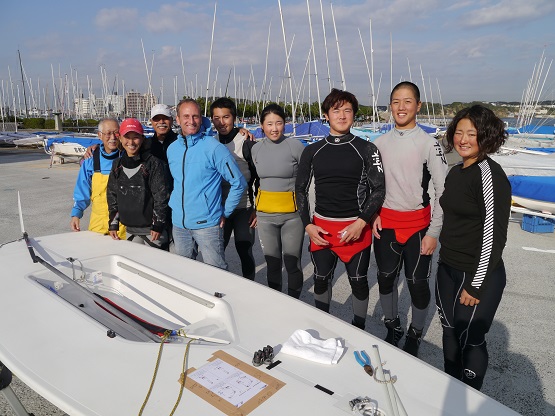
Back at home
Next stop was the Masters’ Finale, sailed at Queen Mary Sailing Club where the water was looking a little low. In the end we had a great weekend and you can read the Yachts and Yachting write up and there is even a video of the weekend to watch. Luckily, I seem to be back to form now, winning all six races, although at the end of the season that doesn’t really help much. Now just a few club races left at Castle Cove Sailing Club to complete. Unfortunately, I won’t be able to do enough races to complete the series but it is always nice to go to the club, which is in walking distance from my flat in Weymouth.
Whilst back in the UK for a bit I have been trying to work on my fitness or at least putting my body back together: it is so important to keep me injury free and to allow me to continue sailing for as long as possible. Cherry’s fitness suite has proved invaluable for this, as not only have I been able to do Pilates to improve my core and flexibility, I have also been able to get a massage straight after. As a bonus it is also very close to the Cowherds pub right by the Southampton Common.
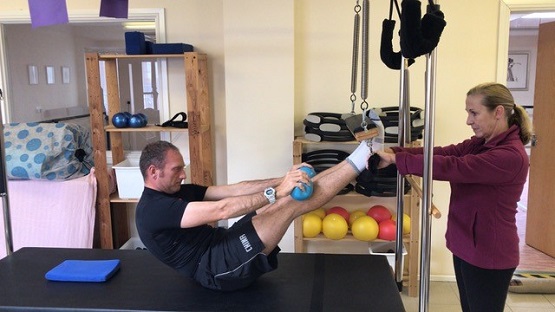
Jon Emmett has over 20 years of coaching experience from grass roots to Olympic Gold.

